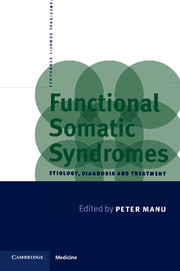Book contents
- Frontmatter
- Contents
- List of contributors
- Preface
- 1 Definition and Etiological Theories
- 2 Chronic Fatigue Syndrome
- 3 Fibromyalgia Syndrome
- 4 Irritable Bowel Syndrome
- 5 Premenstrual Syndrome
- 6 Interstitial Cystitis
- 7 Temporomandibular Disorders
- 8 Chest Pain Syndromes
- 9 Repetitive Strain Injury
- 10 Multiple Chemical Sensitivities
- 11 Psychopharmacology of Functional Somatic Syndromes
- 12 Psychotherapy of Functional Somatic Syndromes
- 13 Determination Of Disability Claimed By Patients With Functional Somatic Syndromes
- 14 Functional Somatic Syndromes: Exploring Common Denominators
- Index
12 - Psychotherapy of Functional Somatic Syndromes
Published online by Cambridge University Press: 08 January 2010
- Frontmatter
- Contents
- List of contributors
- Preface
- 1 Definition and Etiological Theories
- 2 Chronic Fatigue Syndrome
- 3 Fibromyalgia Syndrome
- 4 Irritable Bowel Syndrome
- 5 Premenstrual Syndrome
- 6 Interstitial Cystitis
- 7 Temporomandibular Disorders
- 8 Chest Pain Syndromes
- 9 Repetitive Strain Injury
- 10 Multiple Chemical Sensitivities
- 11 Psychopharmacology of Functional Somatic Syndromes
- 12 Psychotherapy of Functional Somatic Syndromes
- 13 Determination Of Disability Claimed By Patients With Functional Somatic Syndromes
- 14 Functional Somatic Syndromes: Exploring Common Denominators
- Index
Summary
Psychotherapy can be defined as all systematic interactions between a sufferer and a socially designated healer, in which the healer undertakes to relieve the sufferer's distress by symbolic communications (Frank, 1975). The role of psychotherapy in the treatment of bodily diseases depends on the extent to which psychological factors play a role in their etiology and course. As have been demonstrated in the previous chapters in this volume, psychological factors do play a significant role in the evolution of functional somatic syndromes and, as such, psychotherapy is an essential component in the comprehensive treatment of every patient who presents with a functional somatic syndrome.
It is generally assumed that patients who present with functional somatic symptoms are poor candidates for psychotherapy. Bodily preoccupation and the tendency to experience one's self in physical terms can be serious impediments to psychotherapeutic work. Such individuals have difficulty distinguishing somatic from psychological distress and therefore have difficulty identifying and communicating emotional experiences. As such, they present special challenges to the clinician.
Commonly, patients are concerned that their symptoms are caused by organic disease. The tendency to somatize is fundamental to understanding functional somatic syndromes and the psychotherapeutic options available to the clinician. Somatization can be understood from a variety of perspectives. Psychodynamically, it has been regarded as a drive derivative, a defensive displacement or a wish for nurturance and support.
Keywords
- Type
- Chapter
- Information
- Functional Somatic SyndromesEtiology, Diagnosis and Treatment, pp. 237 - 255Publisher: Cambridge University PressPrint publication year: 1998
- 1
- Cited by

